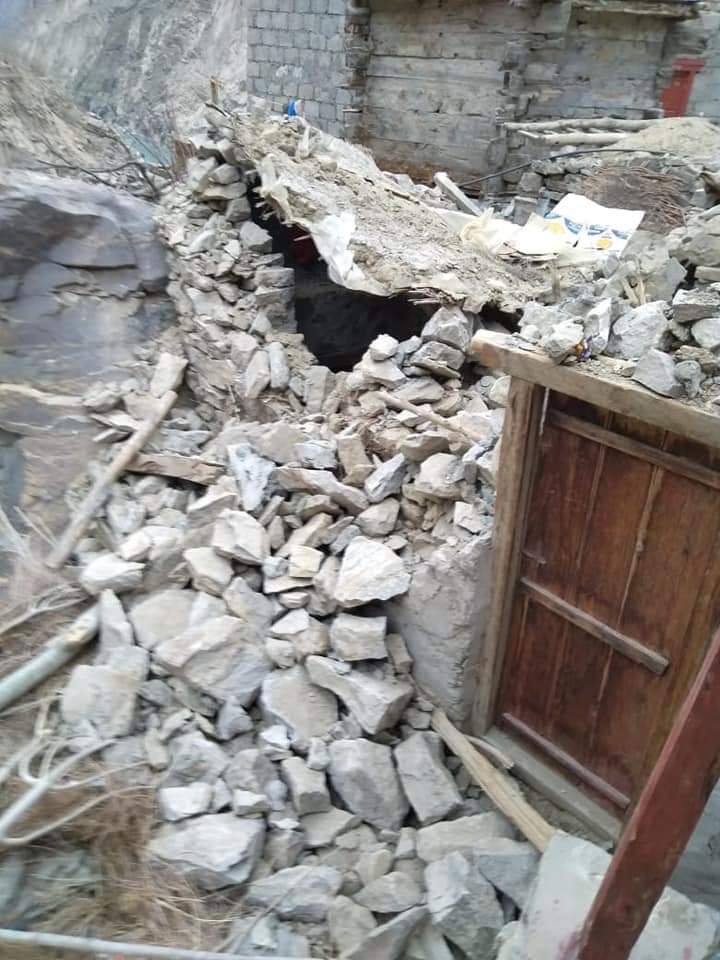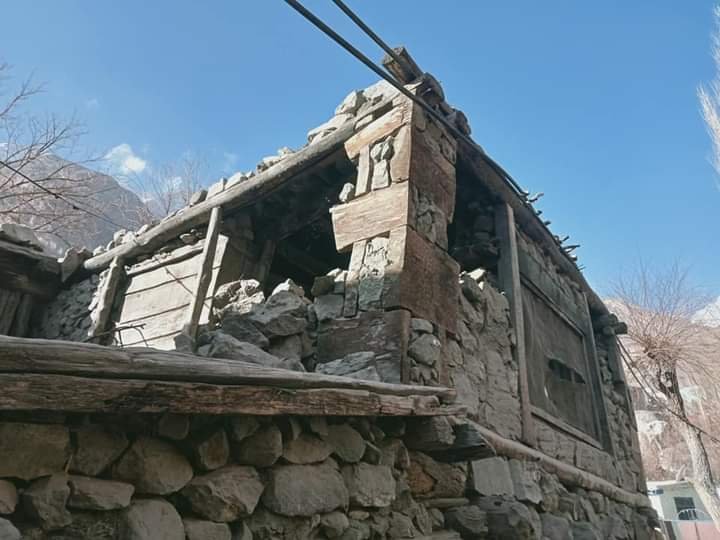Media, activists call for creating awareness about disaster risk management, quake-resistance infrastructures; special focus on differently-abled persons needs
By Ghulamuddin
Media and civil society activists have criticized the irregularities in the distribution of relief goods among earthquake-affected people in Baltistan’s Rondu sub-Division and the incompetence of disaster-risk management and emergency service departments.
They demanded the Gilgit-Baltistan government and Disaster Management Authority (GBMA) provide sufficient essential relief items to the affected families.
On December 27, 2021, an earthquake of 5.3 magnitudes jolted Rondu and surrounding areas compelling 2,500 persons to flee their homes and live in tents and under open skies. The quake damaged fully or partially 450 houses, the newly built Jaglot-Skardu Road, and other link roads within the subdivision, water channels, powerhouses, and dispensaries.
According to US Geological Survey, the epicentre was located 26km towards the south and 45km deep in the limits of district Astore of Gilgit-Baltistan.
The affected families are living in tents in -8 to -15 degrees Celsius. These families do not have enough NFIs to fight the harsh winter. They demanded winterized tents, blankets etc.
Last week, the NDMA chairman discussed with GB Chief Minister on the telephone the damages caused by the quake in Rondu and the need for relief assistance.
Subsequently, the NDMA on the directives of Prime Minister Imran Khan dispatched a consignment of 1,000 winterized tents, 1,000 tarpaulins and 5,000 blankets for the affected families.
Meanwhile, the district administration, GBDMA, Pakistan Red Crescent Society and other agencies claimed that they had provided tents, quilts, food and other essential items as well as basic medical services to the affected people.

However, Iqbal Salik, a local journalist, contested this claim alleging irregularities in the distribution of relief goods. “The relief aid has not reached to the deserving families rather given to households with minor damages twice,” Mr Salik said.
According to media reports, the quake has damaged 10 houses at Talu of the subdivision completely and others partially. Besides, the jolts caused damages to the properties of the sparsely populated villages such as Talu Broq, Ganji, Astak and other far-flung areas of the sub-division.
They have demanded the regional government to take immediate measures for their settlement and rehabilitation at an alternative place.
Media persons, social activists and experts slammed GBDMA for its utter failure in disaster management and reminded it of its mandate.
Speaking about the geological position of GB in Space on Twitter, activist Roshan Din Diameri said that Gilgit-Baltistan is sandwiched between Eurasian and Indian plates.
The Himalayan range is rising 1cm per year and the Indian plate continues to drift northwards, the intermittent jolts sometimes get intense and triggers disasters. He questioned the capacity and capabilities of the GBDMA people. “We have a network of institutions but they don’t have experts and rights persons at the right place. As a result, they are unable to comply with geological surveys. Governments and their agencies are least bothered about their subjects.
Senior Journalist Farman Ali said the Murree tragedy has exposed the incompetence and ineptness of the state, government and relevant organisations and their seriousness to handle emergencies. He called for public awareness about the rights, responsibilities of state organs and stressed making them accountable.
He also called for enhancing the professional skills and capacity of local journalists to do stories on climate change and disasters.
Mr Ali said in GB everyone knows about weather cycles, avalanches, GLOF, flashfloods, monsoon season and snowfall. But the GBDMA and other organisations have miserably failed in disaster risk assessment, evaluation and risk management to minimize damages.
They do not forewarn people about disasters. Japan is at the most active fault lines and frequently experiences earthquakes of up to 8 magnitudes but the country has developed building codes and strictly follows them that’s why the high-intensity earthquake does not cause any damage to infrastructures and their structures remain intact.
Since our region falls in the most active tectonic fault lines and the impact of climate change is yet another challenge. Therefore, the government should focus on the capacity building of relevant organisations and departments and strictly follow building bylaws, codes and environmental assessment impacts during mega projects and constructions.
He suggested that seismology and climate change should be included in the syllabus of schools and colleges; mass awareness programmes and preparedness training should be arranged for people to cope with disasters, Mr Ali said.
Senior journalist Abdul Jabbar Nasir said we should make state organs account for which control resources and power. He exhorted that every state institution should function within its constitutional ambit and ensure the provision of better services to the people.
The practice of looking at security apparatus should end now. However, he quipped that unless and until the powers and capacity of the democratic institutions and relevant departments are improved we have to be dependent on one institution.
Irshad Hussain Kazmi, an activist and Chairperson of the Gilgit-Baltistan Disability Forum, said, differently-abled are the most vulnerable to disasters and neglected persons of society. “Neither government nor society gives us any space, we have to fight for our rights at every moment and every stage.”
He said I had to suffer from Covid-19 while assisting others.
Citing data of disabled persons, he said as per the WHO ratio differently-abled persons in GB’s 2 million population is around 100,000 which is very high.
“We do not have opportunities, and sometimes we qualify on merit but owing to our disability we are sidelined,” said Mr Kazmi.
Journalist Aqil Astori said if the government or other departments are rendering services to the people, it should not be promoted and considered any favour and given any sort of publicity or promotion because they are meant to serve the masses.
He appreciated the resilience of differently-abled persons at times of disasters and otherwise.
He termed Mr Kazmi a real source of inspiration for every individual of Gilgit-Baltistan.
Political activist Shahid Nadeem said the health sector has a primary role at times of disasters to save precious human lives. Health workers and paramedics require capacity building and modern gadgets to handle emergencies. Similarly, basic training in first aid should be given at every school and higher institutes.
Journalist Ali Sher, Arif Kazmi, and others also spoke on the subject and called for strengthening democratic institutions and awareness about disaster risk management.
Moderator of the space Ghulamuddin (GD), shared details of the quake-affected areas of Gilgit-Baltistan and the flaws in governance and service delivery systems.
Summing up the debate, he said that it’s the responsibility of the journalists and civil society activists to raise issues and educate the masses and also build pressure on government and agencies to solve the issues of the people.
Also see this: https://youtu.be/ddBRmtQ9Zx4
He said the NDMA, PDMAs and DDMAs were established in 2010 under an act with a mandate to exclusively handle disasters across the country including preparedness, mitigation, risk reduction, relief and rehabilitation.
The authority is chaired by a serving army officer.
In the post-disaster scenarios, it operates with the support of civil administration and other agencies. Sadly it has failed to fulfil its responsibilities in preparedness and proactive approach in the wake of any forecast. The same approach was witnessed in the Murree tragedy last week, he concluded.

Ghulamudding is a senior journalist, blogger and activist from GB. He writes for High Asia Herald and Baam-e-Jahan.

The High Asia Herald is a member of High Asia Media Group — a window to High Asia and Central Asia












